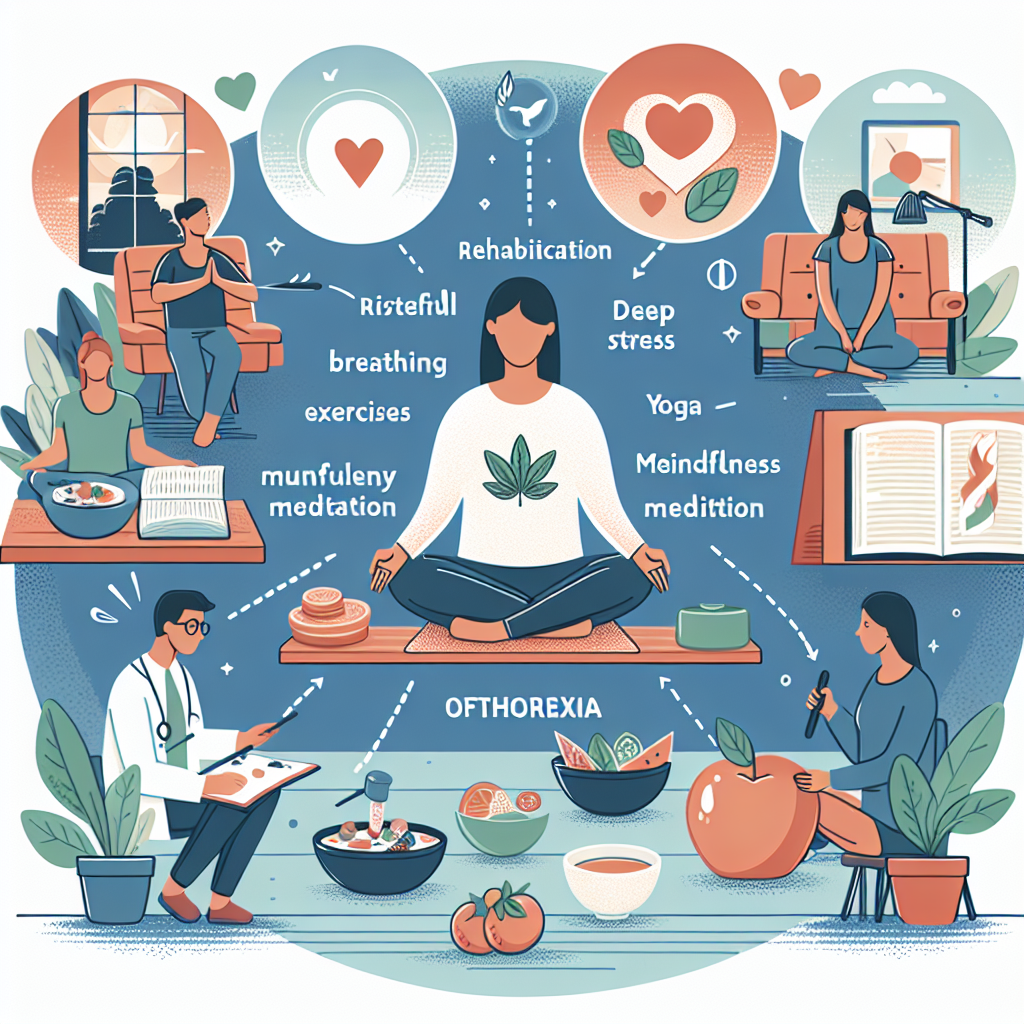-
Table of Contents

“Find Balance, Embrace Healing: Managing Stress in Orthorexia Rehab”
Introduction
Managing stress during rehab for orthorexia involves a multifaceted approach that addresses both the psychological and physical aspects of recovery. It is essential to develop a strong support system, including healthcare professionals, family, and friends, who can provide encouragement and guidance throughout the process. Incorporating stress-reduction techniques such as mindfulness meditation, deep breathing exercises, and yoga can help calm the mind and reduce anxiety. Establishing a structured daily routine that includes balanced nutrition, adequate sleep, and regular physical activity can also contribute to overall well-being. Additionally, engaging in therapeutic activities like journaling, art therapy, or group therapy can provide emotional outlets and foster a sense of community. By combining these strategies, individuals can better manage stress and support their journey towards recovery from orthorexia.
Practical Tips For Managing Stress During Orthorexia Rehab
Managing stress during rehab for orthorexia can be a challenging yet transformative journey. Orthorexia, characterized by an obsession with healthy eating, often leads to severe restrictions and anxiety around food. As you embark on the path to recovery, it is essential to adopt practical strategies to manage stress effectively. By integrating these techniques into your daily routine, you can foster a more balanced and peaceful mindset, which is crucial for long-term healing.
First and foremost, establishing a strong support system is vital. Surround yourself with understanding and compassionate individuals who can offer emotional support and encouragement. This may include family members, friends, or support groups specifically for those recovering from eating disorders. Sharing your experiences and feelings with others who understand your struggles can provide immense relief and reduce feelings of isolation.
In addition to seeking support from others, practicing mindfulness can significantly alleviate stress. Mindfulness involves staying present in the moment and observing your thoughts and feelings without judgment. Techniques such as deep breathing exercises, meditation, and yoga can help you cultivate mindfulness. These practices not only reduce stress but also enhance your overall well-being by promoting relaxation and self-awareness.
Another effective strategy is to develop a structured daily routine. Having a consistent schedule can provide a sense of stability and predictability, which can be particularly comforting during the uncertainty of rehab. Incorporate regular meal times, physical activity, and relaxation periods into your day. This structure can help you regain a sense of control and reduce anxiety related to food and eating.
Moreover, engaging in creative activities can serve as a therapeutic outlet for stress. Whether it’s painting, writing, playing music, or crafting, creative expression allows you to channel your emotions in a positive and constructive manner. These activities can also serve as a distraction from negative thoughts and help you reconnect with your passions and interests.
Physical activity, when approached mindfully, can also be a valuable tool for managing stress. It is important to choose activities that you enjoy and that do not trigger obsessive behaviors. Gentle exercises such as walking, swimming, or tai chi can promote relaxation and improve your mood without the pressure of intense workouts. Always listen to your body and prioritize activities that make you feel good both physically and mentally.
Furthermore, maintaining a balanced diet is crucial during rehab. Work closely with a nutritionist or dietitian who specializes in eating disorders to develop a meal plan that meets your nutritional needs without triggering anxiety. Focus on nourishing your body with a variety of foods and practice self-compassion if you experience setbacks. Remember that recovery is a gradual process, and it’s okay to take small steps towards progress.
Lastly, it is essential to practice self-compassion and patience throughout your recovery journey. Acknowledge that overcoming orthorexia is a complex and ongoing process that requires time and effort. Celebrate your achievements, no matter how small, and be kind to yourself during challenging moments. By fostering a compassionate and patient attitude, you can build resilience and maintain a positive outlook on your path to recovery.
In conclusion, managing stress during rehab for orthorexia involves a combination of seeking support, practicing mindfulness, establishing routines, engaging in creative activities, incorporating gentle physical activity, maintaining a balanced diet, and practicing self-compassion. By integrating these practical tips into your daily life, you can navigate the challenges of recovery with greater ease and cultivate a healthier, more balanced relationship with food and yourself.
Mindfulness Techniques To Reduce Stress In Orthorexia Recovery
Managing stress during rehab for orthorexia can be a challenging journey, but incorporating mindfulness techniques can significantly ease the process. Orthorexia, characterized by an obsession with healthy eating, often leads to severe stress and anxiety. As you embark on the path to recovery, it is essential to adopt strategies that not only address your physical health but also nurture your mental well-being. Mindfulness, the practice of being present and fully engaged in the moment, offers a powerful tool to reduce stress and promote healing.
To begin with, mindfulness meditation can be a cornerstone of your stress management toolkit. This practice involves sitting quietly and focusing on your breath, allowing thoughts to come and go without judgment. By dedicating just a few minutes each day to mindfulness meditation, you can cultivate a sense of calm and clarity. This practice helps to break the cycle of obsessive thoughts about food and health, providing a mental space where you can observe your thoughts without becoming overwhelmed by them.
In addition to meditation, mindful eating is another technique that can transform your relationship with food. Instead of adhering to rigid dietary rules, mindful eating encourages you to savor each bite, paying attention to the flavors, textures, and sensations. This approach not only enhances your enjoyment of food but also helps you recognize and respond to your body’s hunger and fullness cues. By practicing mindful eating, you can gradually shift your focus from the nutritional content of food to the experience of eating itself, reducing the anxiety associated with meal times.
Furthermore, incorporating mindful movement into your daily routine can be incredibly beneficial. Activities such as yoga, tai chi, or even gentle stretching can help you reconnect with your body in a positive and nurturing way. These practices emphasize the importance of listening to your body and moving in a way that feels good, rather than adhering to a strict exercise regimen. Mindful movement can also serve as a form of meditation in motion, allowing you to release tension and stress while fostering a sense of inner peace.
Another effective mindfulness technique is the practice of gratitude. Taking a few moments each day to reflect on the things you are grateful for can shift your focus from stress and anxiety to positivity and appreciation. Keeping a gratitude journal, where you write down three things you are thankful for each day, can be a simple yet powerful way to cultivate a positive mindset. This practice can help you recognize the progress you are making in your recovery and appreciate the small victories along the way.
Moreover, engaging in mindful breathing exercises can be a quick and effective way to manage stress in the moment. Techniques such as deep breathing, where you inhale deeply through your nose and exhale slowly through your mouth, can activate the body’s relaxation response. This can be particularly helpful during moments of acute stress or anxiety, providing an immediate sense of calm and grounding.
Lastly, it is important to remember that mindfulness is a practice, not a destination. It is normal to have moments of struggle and setbacks along the way. The key is to approach your recovery with compassion and patience, recognizing that each step forward, no matter how small, is a step towards healing. By integrating mindfulness techniques into your daily life, you can create a supportive and nurturing environment for your recovery, reducing stress and fostering a sense of balance and well-being.
Q&A
1. **Question:** What are some effective relaxation techniques to manage stress during rehab for orthorexia?
**Answer:** Effective relaxation techniques include deep breathing exercises, progressive muscle relaxation, mindfulness meditation, and yoga.
2. **Question:** How can I ensure a supportive environment during my rehab for orthorexia?
**Answer:** Ensuring a supportive environment can be achieved by surrounding yourself with understanding friends and family, participating in support groups, and working closely with healthcare professionals specialized in eating disorders.
Conclusion
Managing stress during rehab for orthorexia involves a multifaceted approach that includes seeking professional help, practicing mindfulness and relaxation techniques, maintaining a balanced routine, engaging in supportive social interactions, and setting realistic goals. Professional guidance from therapists and nutritionists can provide tailored strategies and coping mechanisms. Mindfulness practices such as meditation, deep breathing exercises, and yoga can help reduce anxiety and promote mental well-being. Establishing a structured daily routine that includes time for self-care, hobbies, and physical activity can create a sense of normalcy and control. Building a support network of friends, family, or support groups can offer emotional support and encouragement. Lastly, setting achievable goals and celebrating small victories can foster a positive mindset and gradual progress. By integrating these strategies, individuals can effectively manage stress and support their recovery journey.



